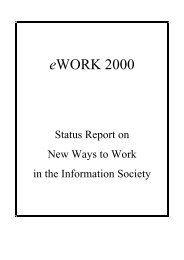Proceedings of 8th European Assembly on telework (Telework2001)
Proceedings of 8th European Assembly on telework (Telework2001)
Proceedings of 8th European Assembly on telework (Telework2001)
You also want an ePaper? Increase the reach of your titles
YUMPU automatically turns print PDFs into web optimized ePapers that Google loves.
234Klaudia Smolag gave her article a very self-explanatory name “Distance Learning in Poland”.Despite clear advantages, distance learning is not yet so much in use as it should and could be.Many teachers feel that computer-network –based educati<strong>on</strong> would necessitate very high computingskills. The paper reports too results from a survey c<strong>on</strong>ducted by the author in several Polishuniversities.Barbara Steward and Wendy Spinks c<strong>on</strong>tributed the paper “Telework and Health Management:UK and Japanese Research”. The paper discusses occupati<strong>on</strong>al health outcomes <str<strong>on</strong>g>of</str<strong>on</strong>g> <strong>telework</strong>. Bothsimilarities and differences between UK and Japan are found. The paper shows that <strong>telework</strong> willmake necessary a totally new approach to and definiti<strong>on</strong> <str<strong>on</strong>g>of</str<strong>on</strong>g> “sickness” and “absence” in workingrelati<strong>on</strong>s.Wolfgang Appelt and K<strong>on</strong>rad Klöckner presented the paper “Tele-cooperati<strong>on</strong> with the BSCWShared Workspace System”. The acr<strong>on</strong>ym comes from the words “Basic Support for Co-operativeWork”. This system, partly developed by EU Finance, is already in wide use in Europe, anddescribed in great detail in the paper. Teleworking relati<strong>on</strong>ships are <strong>on</strong>e natural applicati<strong>on</strong> areafor this system.Wolfgang Heilmann, in his paper “Theses and Objectives <strong>on</strong> the Management <str<strong>on</strong>g>of</str<strong>on</strong>g> Tele-Processes”discusses the wide array <str<strong>on</strong>g>of</str<strong>on</strong>g> applicati<strong>on</strong> <str<strong>on</strong>g>of</str<strong>on</strong>g> telecommunicati<strong>on</strong> in our society. He calls for newmanagement and leadership practices to take advantage <str<strong>on</strong>g>of</str<strong>on</strong>g> these new teleprocesses.Timo Kultanen too named his paper “Emoti<strong>on</strong>al Intelligence in Superior Knowledge Work” in aself-explanatory way. The paper stresses the importance <str<strong>on</strong>g>of</str<strong>on</strong>g> emoti<strong>on</strong>al intelligence in knowledgework, and focuses especially <strong>on</strong> the emoti<strong>on</strong>al intelligence skills <str<strong>on</strong>g>of</str<strong>on</strong>g> managers in <strong>telework</strong>relati<strong>on</strong>ships.Pasi Pyöriä, with the paper “The Problems and Possibilities <str<strong>on</strong>g>of</str<strong>on</strong>g> Telework: a Critical Assessment”brings to discussi<strong>on</strong> the fact that relatively few Finns actually engage themselves in traditi<strong>on</strong>alwork-c<strong>on</strong>tract based <strong>telework</strong>. He recommends <strong>telework</strong> c<strong>on</strong>tracts to be made explicit and formal,and organizati<strong>on</strong>s to start with part-time <strong>telework</strong>.Hannu Salmela c<strong>on</strong>tributed the paper “From Generalists to Specialists: Managing Knowledge in aDistributed Service Organizati<strong>on</strong>”. The paper discusses the simultaneous challenges <str<strong>on</strong>g>of</str<strong>on</strong>g> providingservice close to customers, but at the same time maintaining organizati<strong>on</strong>al learning and sharedknowledge.Matti Vartiainen discussed “The Functi<strong>on</strong>ality <str<strong>on</strong>g>of</str<strong>on</strong>g> Virtual Organizati<strong>on</strong>s”. The paper studies thefuncti<strong>on</strong>s <str<strong>on</strong>g>of</str<strong>on</strong>g> virtual organizati<strong>on</strong>s from several c<strong>on</strong>ceptual viewpoints, and documents throughthree cases the frameworks in practice.Mikko Tarkiainen, in the paper “Mobile Tools for e-working in Geographically DistributedTeams - Cases: Electrolux Zanussi and Nokia Corporati<strong>on</strong>”, presents results around an EU project“Moti<strong>on</strong>”, which is to provide c<strong>on</strong>ceptual architectures and later c<strong>on</strong>crete products to supportmobile workers.Lars Tollet, with the paper “Towards a More Sustainable Ec<strong>on</strong>omy in Suburbia?”, provided adetailed case study <str<strong>on</strong>g>of</str<strong>on</strong>g> a Finnish cooperative enterprise, Taitoverkko. The case is discussed fromthe viewpoint that such cooperati<strong>on</strong>s could save rural areas from decline.








